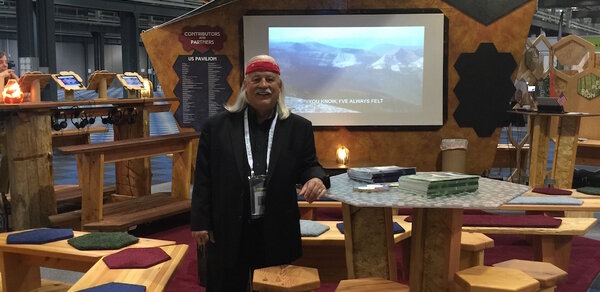A Word From Tom: “Day Two Of The World Forestry Congress”

It was a full day of networking, advocating, and learning during my second day at the World Forestry Congress. Here are a few highlights:
During a private discussion with the Secretariat of CITES I was made aware of a much broader international rosewood crisis, encompassing Laos, Cambodia, Vietnam and Thailand- in addition to the on-going illegal export of rosewood from Madagascar. It seems there is an insatiable appetite for rosewood furniture and other rosewood products in China. The high prices Chinese consumers have been willing to pay nurtures the illegal trade and is challenging the viability of CITES enforcement. During a breakfast discussion I asked Double Helix about the ability to identify the origin of trees through DNA tracking, and was pleased to learn that technology has advanced significantly. Not only will DNA samples verify the country and region where a tree grew, but can easily match a log to its stump.
This enlightenment enticed a variety of follow-up meetings and discussions. Bedell Guitars has launched a pilot project with Andrew Dudley at TreeTag to apply satellite technology to track each mahogany tree we harvest with our partners at CUSTOSEL in Guatemala throughout the supply chain to our receiving door and ultimately into each instrument we build with a Honduran mahogany neck. Double Helix has the capability to provide a DNA marker with each tree stump and then a verifying DNA marker when we convert the mahogany billets into Bedell Guitar necks. Combining the satellite monitoring of TreeTag with the DNA verification of Double Helix we can assure complete transparency from our wood sources, we call this Seed to Song.
Of course, it will take some time for all of this to be implemented, but it is incredible to have the vision and the partners to begin the journey. The longterm key to preventing illegal logging and to reward transparent sustainable logging concessions will be technology.
I recall just a few years back the music instrument industry was outraged by the Lacey Act Amendments of 2008, predicting it would be the demise of the guitar industry. It is rewarding to see that our acoustic instrument sector is responding to the opportunity to honor our forests and be accountable for the thoughtful and ethical harvest of the precious tone woods we use, that technology advances will be making it more feasible to be held accountable, and that the connections of our instruments and music to the forests will be evermore robust and direct.
In the afternoon I gave a presentation on the relationship of the world’s forests to our music at the US National Forest Service arena in the Pavilion. As a consumer products company, being one of the only customers of the forest here at the Congress I have found much interest in “Why are you participating?” “Do your customers care about where your wood comes from and how it is harvested?” “What do you hope to gain by participating in the World Forestry Congress?” As most of the participants at the Congress are forestry governmental officials and members of NGOs engaged in forestry, this is largely an advocacy event. At the end of the day governments are going to have to have the resolve to directly address the incentives behind illegal logging AND consumers are going to need to care about how their consumption impacts our global eco-system and global warming. Governmental resolve. Consumer awareness and spending. At Bedell Guitars we are doing our part by providing musicians guitars that promote sustainable forests.
Learn more about the World Forestry Congress here.
Peace,
Tom Bedell
